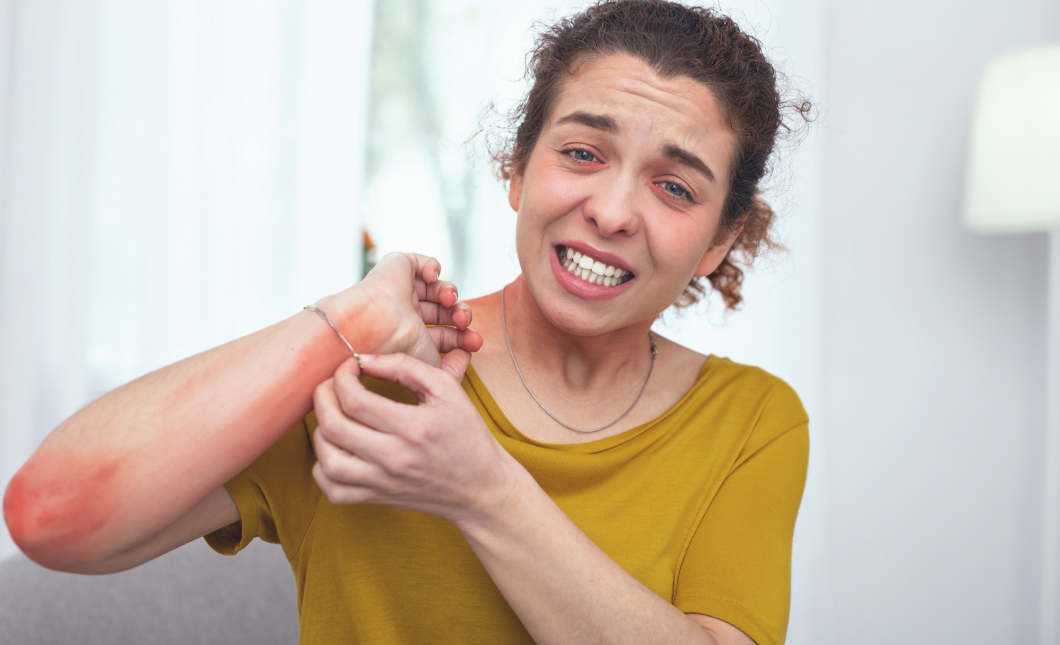When Your Skin Speaks Loudly: A Homeopathic Look at Psoriasis
Minal, a 29-year-old schoolteacher, had never imagined her skin would become her greatest source of discomfort—and self-consciousness. What started as a few dry patches behind her knees during winter gradually spread to her arms, scalp, and back. They weren’t just dry—they were red, inflamed, and covered with flaky white scales. Moisturizers didn’t work. Creams helped for a while, but the patches always returned, often more stubborn than before. The physical irritation was real, but the emotional toll was even more profound—especially when people stared or asked if it was “contagious.” Tired of chasing temporary relief, Minal turned to homeopathy, where her skin wasn’t just treated—it was understood.
Psoriasis, while medically defined as a chronic autoimmune skin condition, is experienced by patients as a complex, often exhausting struggle. The immune system, which is designed to protect the body, turns hyperactive and accelerates the life cycle of skin cells. Instead of the usual 28-day turnover, skin cells in psoriasis regenerate in just 3–5 days, leading to a buildup of immature skin on the surface. The result? Thickened, scaly, itchy plaques that can crack, bleed, and invite unwelcome attention.
There are different faces to this condition. Plaque psoriasis, the most common, brings raised red patches with silvery scales. Guttate psoriasis appears as droplet-like lesions, often after infections. Inverse psoriasis hides in body folds and shows up as shiny red areas without scales. Nail psoriasis can lead to pitting, thickening under the nails, discoloration, and even nail loss. Then there’s pustular and erythrodermic psoriasis—more aggressive, sometimes serious forms requiring careful attention.
But psoriasis isn’t just about skin. Up to 30% of patients may develop psoriatic arthritis, where joints become painful, stiff, and inflamed—turning a skin issue into a systemic burden.
Symptoms That Go More Than Skin Deep
- Itchy, dry, scaly patches of skin—often on elbows, knees, scalp, or back
- Pain or burning in affected areas
- Cracked skin that may bleed
- Nail pitting, discoloration, or thickening
- Joint pain or swelling (in psoriatic arthritis)
- Embarrassment, anxiety, and low self-esteem—especially during flare-ups
The condition often waxes and wanes. Stress, cold weather, infections, certain medications (like beta blockers or lithium), and even small injuries to the skin (Koebner phenomenon) can provoke an outbreak.
Diagnosing Psoriasi
In most cases, a dermatologist can identify psoriasis by examining the skin and nails. If there’s any doubt, a skin biopsy might be done to rule out other conditions like eczema or fungal infections. Joint pain may call for blood tests and imaging to screen for psoriatic arthritis.
Homeopathy: Healing from the Inside Out
In psoriasis, the immune system overreacts and triggers a cycle of inflammation and rapid skin cell proliferation. This makes it clear that real healing must go deeper than just surface-level symptom control.
Homeopathy offers one of the most effective natural approaches for autoimmune skin conditions like psoriasis. It stands apart from conventional treatment by using non-suppressive, side-effect-free remedies that stimulate the body’s healing intelligence. Instead of merely covering up the patches with steroid creams or immunosuppressants, homeopathy aims to balance the immune system, which is at the heart of the condition.
Homeopathy doesn’t just alleviate symptoms like scaling, cracking, itching, or redness—it helps prevent the further spread of lesions and can even address associated joint symptoms in psoriatic arthritis.
Treatment in homeopathy is progressive and unfolds in stages. In acute flare-ups, homeopathic remedies help soothe inflammation and discomfort. In chronic and recurrent cases, they are directed toward correcting the constitutional tendencies and psychological stressors that often underlie the disease.
One of the greatest strengths of homeopathy is its individualized approach. No two patients are treated identically. The choice of remedy depends on the totality of symptoms, including emotional triggers, food cravings, personality traits, and response to climate. Over time, with proper case management, many patients experience long-term remission and become significantly less reliant on conventional medication.
However, it’s important to understand that homeopathy works gradually. Psoriasis is a deep-rooted autoimmune condition, and sustained improvement requires patience and commitment. But for those who stay the course, the rewards often extend far beyond skin—bringing emotional resilience, stronger immunity, and overall vitality.
A Glimpse at Common Remedies
Each remedy below is used in distinct types of psoriasis cases and only after detailed case evaluation:
- Graphites– For dry, cracked skin with oozing and thick crusts; often behind ears, joints, and folds
- Arsenicum Album– For red, burning patches with restlessness and anxiety; skin feels better with warmth
- Sulphur– Intense itching, especially at night; skin eruptions with a general aversion to bathing
- Mezereum– Thick scabs with pus underneath; especially on scalp with offensive discharge
- Lycopodium– Dry patches and nail involvement; often with digestive issues and performance anxiety
- Petroleum– Deep cracks and painful dryness; worsens in winter
- Sepia– Suited to women with hormonal linkages and emotionally drained personalities.
Note: Homeopathic medicines should be prescribed by a trained physician only after detailed case-taking.
Frequently Asked Questions
- Is psoriasis contagious? Can it spread through touch or other contact?
Absolutely not. Psoriasis is an autoimmune condition, not an infectious disease. It cannot be transmitted by skin contact, sharing personal items, or through any form of physical interaction. - I’ve had psoriasis for years. Now, my joints are hurting. What’s happening?
This may indicate the onset of psoriatic arthritis, which affects about 30% of individuals with psoriasis. It occurs when the immune system starts attacking the joints, leading to pain, stiffness, and swelling. Early recognition and treatment are crucial to prevent joint damage. - What homeopathic medicine helps in psoriatic arthritis?
In clinical practice, Rhus Toxicodendron (Rhus Tox)has shown remarkable benefits. It is especially suited for cases with swollen, stiff, painful joints that improve with movement and warmth. However, prescription should always be based on individual case evaluation. - Is there a connection between vitamin D and psoriasis?
Yes, studies have shown that vitamin D can help reduce the severity of psoriasis. It helps regulate skin cell production, and many patients report improvement when vitamin D levels are optimized—either through sunlight or supplements under medical supervision. - Can sunlight help in psoriasis?
Mild, controlled exposure to sunlight can indeed be beneficial. UV rays help slow down the rapid growth of skin cells. However, overexposure or sunburn can worsen psoriasis, so moderation and guidance are key. - Can diet help?
While not a cure, an anti-inflammatory diet (rich in omega-3s, antioxidants, and fiber) and avoiding triggers (like alcohol, red meat, and refined sugars) often helps.
In Conclusion
Psoriasis is more than a skin condition—it’s an internal signal calling for deeper balance. Homeopathy answers this call with a gentle, targeted, and holistic approach that brings not just clearer skin, but a more resilient and balanced self. For patients like Minal, homeopathy often becomes not just a therapy—but a turning point toward real healing.



